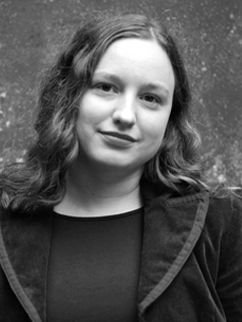What if these walls could speak? Entering houses, I often think about that. The debut novel of young German author Juliana Kálnay, Eine kurze Chronik des allmählichen Verschwindens (which translates like A gradual Evanescence) provides some answers to this. It is a novel about life in an apartment building somewhere in Germany. It shelters very special and very different individuals. In loose chapters the reader gravitates into the lives of the people living under one roof. From floor to floor, we get nearer and listen to their voices, see them making steps, asking, living, suffering, mostly separate from each other and nevertheless forming a unity. Lukas, Rita, Oskar oder little Maia are just a few of them. Reading this, I nearly feel the heartbeat of this house in every corner. It’s all surreal.
The novel’s form is unique. Juliana Kálnay tells her story without a logic structure. There’s no order to her chapters. Instead, reading, I am shifted and taken into the midst of a place which is sort of a natural habitat for everybody there. This should be the authentic feeling, I guess, that is evoked while I gradually dive into the lives of my neighbours. In between calm and noises, there’s much space left for suggestive forces. Eine kurze Chronik des allmählichen Verschwindens is a powerful book.
A talk with the author.

Juliana Kálnay on writing, her role models and ideas noted on post-its.
Juliana Kálnay, how long have you been working on Eine kurze Chronik des allmählichen Verschwindens?
It has taken me six years from my very first line to the final step, the novel itself. However, during this time, I haven’t written continuously. There were phases I didn’t even touch the draft.
As an author, you have been publishing your texts for a while now. Which form do you like most when it comes to literature?
For my own writing-? I think shorter narrative forms have often proved most suitable for me. Maybe that’s the reason behind my first novel which sort of comprises the pieces of a “puzzle”.
You studied „Literary Writing“ in Hildesheim (Germany).
Yes, „Literarisches Schreiben“ (“Literary Writing”) was the subject in which I hold my Master. Prior to that I was an undergraduate student in „Creative Writing & Cultural Journalism“ in Hildesheim, an opportunity I had heard of after college.
So you clearly fancied writing?
Well, without that I’d never have applied. Writing stories had already been my scene as a child and also as a teenager. So when I read about the degree programme in Hildesheim, I couldn’t resist. It seemed to be in line with my interests.
Your best memory when you think of your years as a student?
It’s hard to name one single memory. But I have met some amazing people during my years there who are still my friends today. We share some memorable moments.
Some literary role models you could mention?
One of them is Julio Cortázar, an author from Argentina whose manner and approach to literature has always been sort of a paradigm for me. For my debut novel, I regard Georges Perec, a French author, as another important role model for me. He published a novel in 1978 whose setting is an apartment building, too, but it comes with a different kind of structure. There are some more authors and texts which were important and helpful for me when it comes to a certain tone or perspective. One of them is Aglaja Veteranyi.
One of your most favourite books?
The Notebook by Agota Kristof, a book I’ve read recently and which really intrigues me. Incidentally, I don’t think one should talk about novels only when it comes to one’s favorite books. There are so many amazing narratives I really like. My weak spot are books that break ranks. I prefer books which disrupt the usual form of the novel, books which cannot be categorised when it comes to a specific genre.
Which narratives do you have in mind?
There are some great narratives of Julio Cortázar, for instance „The Southern Highway” and „House taken Over“. I also like Jorge Luis Borges who uses to write shorter texts, for instance in his Ficciones. I have just read Seltsame Materie by Terézia Mora. Many of her stories convey a special atmosphere I like. And I really like Die Liebe zur Zeit des Mahlstädter Kindes by Clemens J. Setz. Another example of narratives I like is by Mariana Enriquez and only available in Spanish, Las cosas que perdimos en el fuego.
By the way, I really recommend the website “The Short Story Project“. It offers some short stories in different languages which are really worth reading.
Are you someone who takes notes in everyday life?
No, not that often. When I was a student I tried to to so until I found out that memory has it all for me. From time to time I write down a quote I stumbled upon. Or I awake with a start and note a word on a post-it, a word I had been searching for during the day.
When and how do you write down thoughts?
At my desk at home. Mostly I use my computer if the things I note aren’t suitable for post-its.
Your writing languages are German and Spanish. Is there a language you prefer? Are there differences regarding the writing process?
A couple of years ago I used to write more Spanish texts. It changed when I started studying in Germany. We used to write in workshops led in German. But occasionally, during writing, I have Spanish sentences in mind. Unfortunately, I have forgotten most of them. They would have been so useful for me now for I have just started to translate my own book into Spanish. On the other hand translating the book is totally different from writing the original text.
Some authors like writing away from home, away from their desk. Are you one of those?
You mean for writing? I’m afraid writing at public spaces like cafes or libraries doesn’t feel good for me. I prefer my own desk. I would love writing during a train ride. But I cannot. The good thing is that I
Danke und alles Gute, Juliana Kálnay!
Juliana Kálnay, geboren 1988 in Hamburg, wuchs in Deutschland und Spanien auf. Texte veröffentlichte sie bereits in deutsch- und spanischsprachigen Anthologien und Zeitschriften. 2016 erhielt sie das Arbeitsstipendium Literatur der Kulturstiftung des Landes Schleswig-Holstein. Sie lebt in Kiel.
Für Eine kurze Geschichte des allmählichen Verschwindens erhielt Juliana Kálnay den aspekte-Literaturpreis 2017 des ZDF.


0 comments on “Interview | Author Juliana Kálnay on writing her debut novel: “Memory has it all””